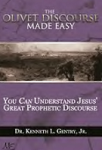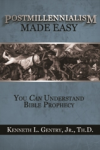DO PRETERISM AND POSTMILLENNIALISM DIFFER?
 PMT 2015-038 by Kenneth L. Gentry, Jr.
PMT 2015-038 by Kenneth L. Gentry, Jr.
From time to time I receive a question regarding the difference between preterism and postmillennialism. Some folks are confused if they contradict or if they are speaking of the same thing. Let me briefly distinguish the two theological concepts.
Preterism
The word “preterist” is the transliteration of a Latin word that means “passed by.” The orthodox preterist sees certain passages as referring to the destruction of Jerusalem and the temple in AD 70, though many evangelicals understand these to be speaking of the second coming of Christ at the end of history.
The second coming and the AD 70 judgment of Christ on Jerusalem are often spoken of with similar language. This is because they are theologically related concepts. The AD 70 holocaust is a microcosmic picture of the final day of history when Christ returns in judgment. That is, AD 70 is small, historical picture or advanced sample of what the final judgment will be like.
Olivet Discourse Made Easy (by Ken Gentry)
Verse-by-verse analysis of Christ’s teaching on Jerusalem’s destruction in Matt 24. Show the great tribulation is past, having occurred in AD 70.
See more study materials at: www.KennethGentry.com
Preterism has nothing necessarily to do with postmillennialism. There are preterist postmillennialists and there are historicist postmillennialists. Both are true forms of postmillennialism. There are also preterist amillennialists. Thus preterism does not commit one to any particular eschatological system.
Preterism is more of a hermeneutic tool than a theology. That is, it helps us understand certain passages without committing us to theological position.
Postmillennialism
Postmillennialism is a theological position on “the last things” that are to occur toward the end of history, an eschatological school of thought. Postmillennialism is an optimistic eschatological system that believes that Christ’s kingdom is currently present in history and will gradually win a dominant sway over men and nations as the gospel makes fuller progress in the world.
Postmillennialism holds to a single final coming of Christ (no separate rapture), a general resurrection of the saved and the lost simultaneously, and a general judgment of the saved and the lost in one setting.
Postmillennialism Made Easy (by Ken Gentry)
Basic introduction to postmillennialism. Presents the essence of the postmillennial argument and answers the leading objections. And all in a succinct, introductory fashion.
See more study materials at: www.KennethGentry.com
Thus, postmillennialism looks for the growing influence of the gospel in history before the end comes. After a long time of dominance, Christ will return to resurrect and judge all men and end history while establishing the eternal, consummate order.
Conclusion
Thus, preterism and postmillennialism are altogether different concepts. Preterism is basically a hermeneutic, whereas postmillennialism is a theological system. They may occur simultaneously in one’s worldview, or they may be found in differing systems of thought.









Kenneth L. Gentry Jr.'s Blog
- Kenneth L. Gentry Jr.'s profile
- 85 followers



